2023届高三英语一轮复习英语16时态 课件-(25张ppt)
文档属性
| 名称 | 2023届高三英语一轮复习英语16时态 课件-(25张ppt) |  | |
| 格式 | pptx | ||
| 文件大小 | 882.3KB | ||
| 资源类型 | 教案 | ||
| 版本资源 | 通用版 | ||
| 科目 | 英语 | ||
| 更新时间 | 2022-10-18 11:50:15 | ||
图片预览

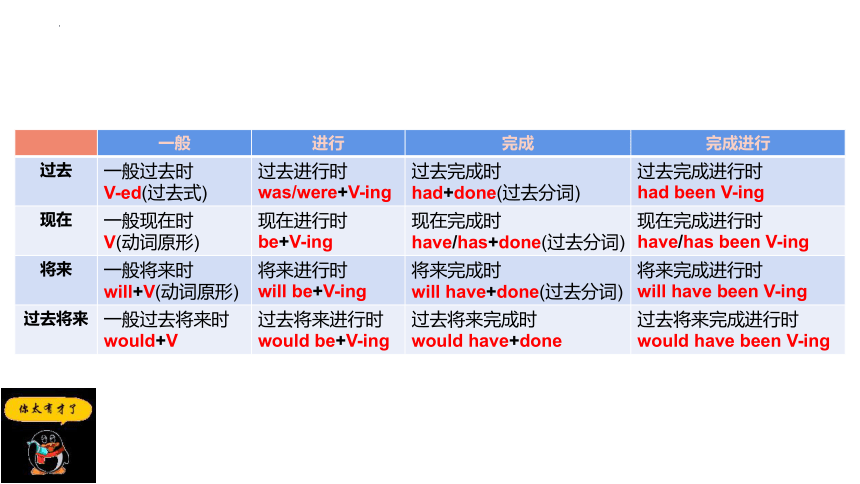
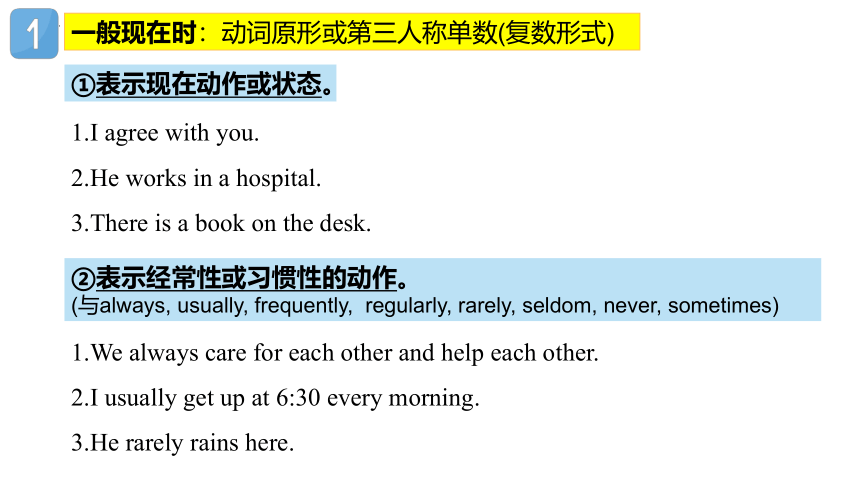
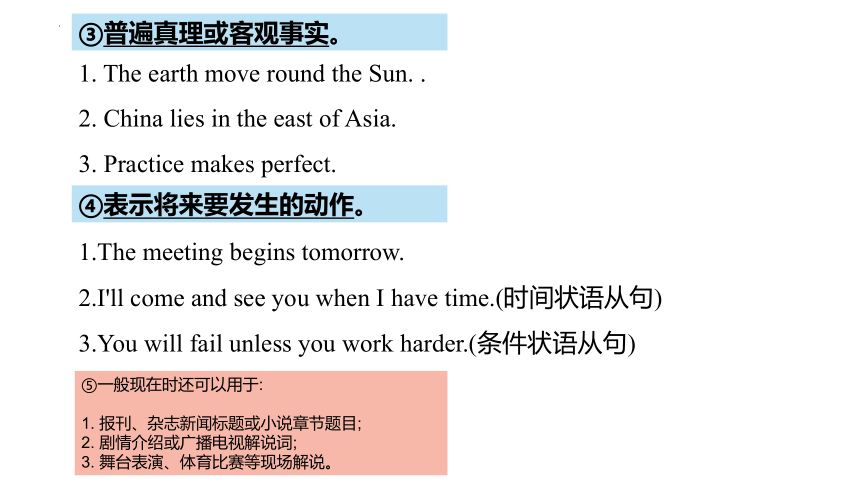
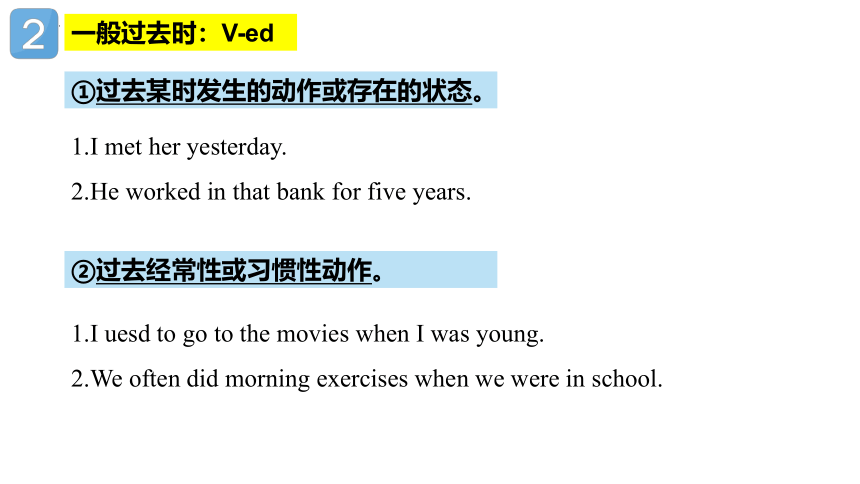
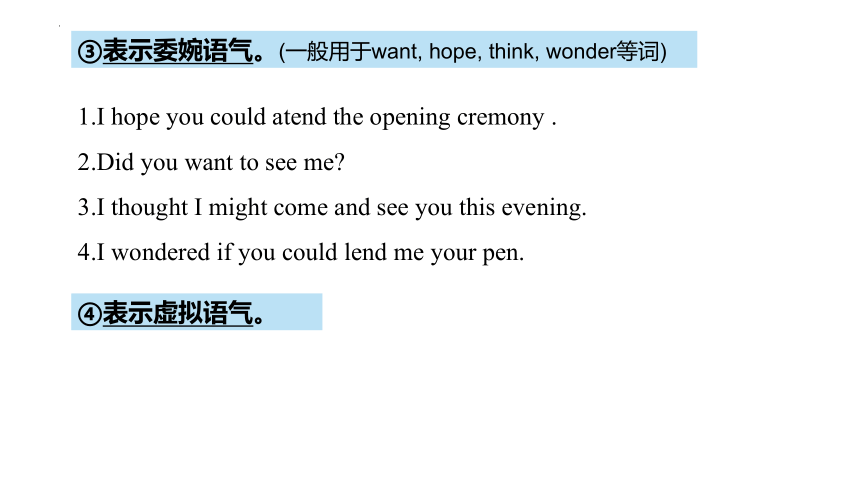
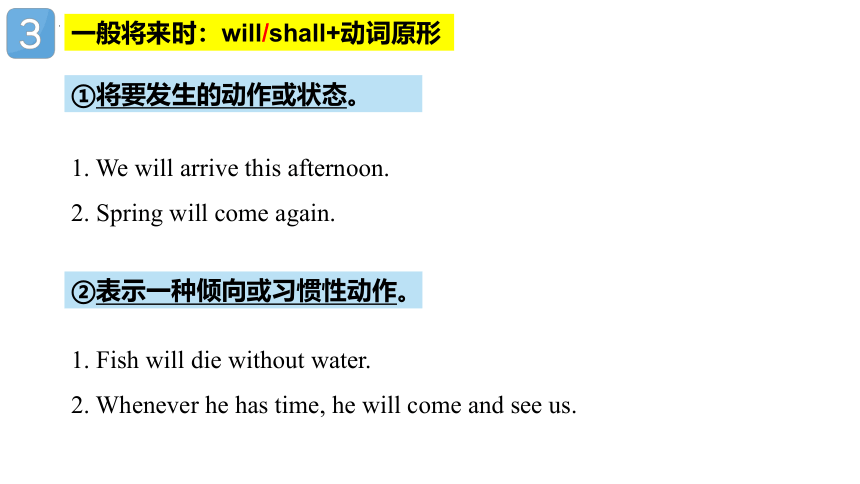
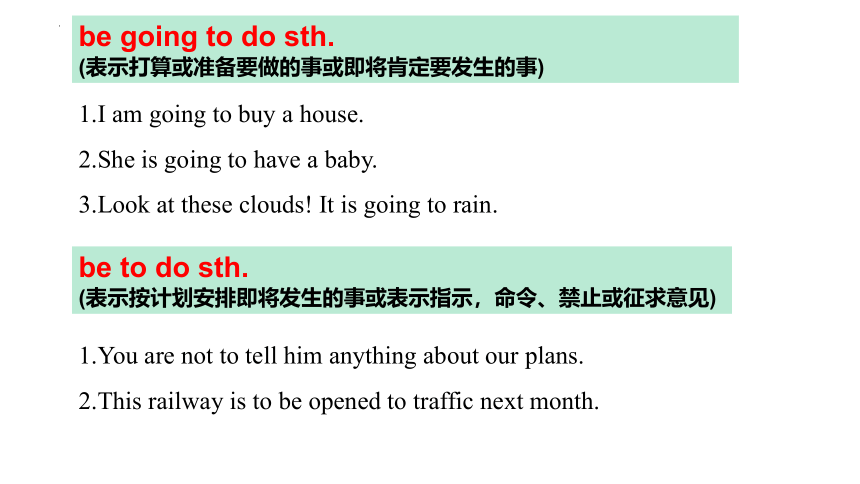
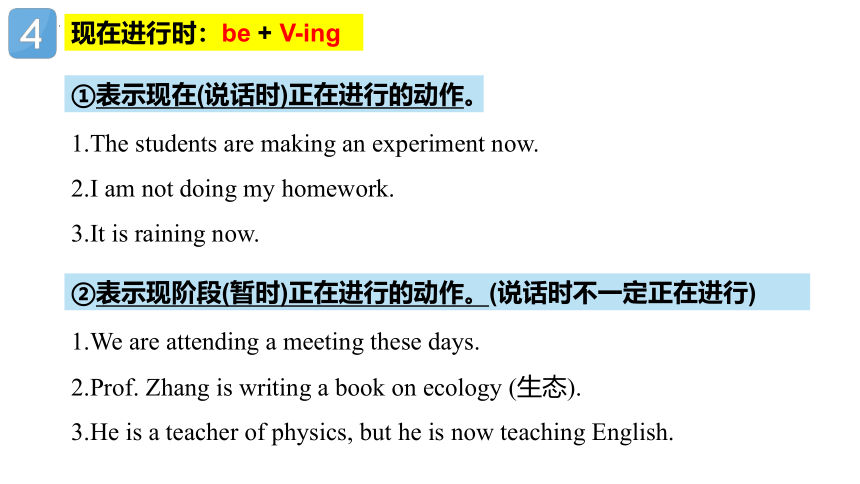
文档简介
(共25张PPT)
英 语
英语时态
一般 进行 完成 完成进行
过去 一般过去时 V-ed(过去式) 过去进行时 was/were+V-ing 过去完成时 had+done(过去分词) 过去完成进行时
had been V-ing
现在 一般现在时 V(动词原形) 现在进行时 be+V-ing 现在完成时 have/has+done(过去分词) 现在完成进行时
have/has been V-ing
将来 一般将来时 will+V(动词原形) 将来进行时 will be+V-ing 将来完成时 will have+done(过去分词) 将来完成进行时
will have been V-ing
过去将来 一般过去将来时 would+V 过去将来进行时 would be+V-ing 过去将来完成时 would have+done 过去将来完成进行时
would have been V-ing
一般现在时:动词原形或第三人称单数(复数形式)
①表示现在动作或状态。
1.I agree with you.
2.He works in a hospital.
3.There is a book on the desk.
②表示经常性或习惯性的动作。
(与always, usually, frequently, regularly, rarely, seldom, never, sometimes)
1.We always care for each other and help each other.
2.I usually get up at 6:30 every morning.
3.He rarely rains here.
③普遍真理或客观事实。
1. The earth move round the Sun. .
2. China lies in the east of Asia.
3. Practice makes perfect.
④表示将来要发生的动作。
1.The meeting begins tomorrow.
2.I'll come and see you when I have time.(时间状语从句)
3.You will fail unless you work harder.(条件状语从句)
⑤一般现在时还可以用于:
1. 报刊、杂志新闻标题或小说章节题目;
2. 剧情介绍或广播电视解说词;
3. 舞台表演、体育比赛等现场解说。
一般过去时:V-ed
①过去某时发生的动作或存在的状态。
1.I met her yesterday.
2.He worked in that bank for five years.
②过去经常性或习惯性动作。
1.I uesd to go to the movies when I was young.
2.We often did morning exercises when we were in school.
③表示委婉语气。(一般用于want, hope, think, wonder等词)
1.I hope you could atend the opening cremony .
2.Did you want to see me
3.I thought I might come and see you this evening.
4.I wondered if you could lend me your pen.
④表示虚拟语气。
一般将来时:will/shall+动词原形
①将要发生的动作或状态。
1. We will arrive this afternoon.
2. Spring will come again.
②表示一种倾向或习惯性动作。
1. Fish will die without water.
2. Whenever he has time, he will come and see us.
be going to do sth.
(表示打算或准备要做的事或即将肯定要发生的事)
1.I am going to buy a house.
2.She is going to have a baby.
3.Look at these clouds! It is going to rain.
be to do sth.
(表示按计划安排即将发生的事或表示指示,命令、禁止或征求意见)
1.You are not to tell him anything about our plans.
2.This railway is to be opened to traffic next month.
现在进行时:be + V-ing
①表示现在(说话时)正在进行的动作。
1.The students are making an experiment now.
2.I am not doing my homework.
3.It is raining now.
②表示现阶段(暂时)正在进行的动作。(说话时不一定正在进行)
1.We are attending a meeting these days.
2.Prof. Zhang is writing a book on ecology (生态).
3.He is a teacher of physics, but he is now teaching English.
③表示不断重复的习惯性动作。
1.He is always helping people.
2.It is always raining.
3.She is continually changing clothes.
④表示渐进的过程。(只适用于某些表示转变的动词)
1.People are becoming less tolerant of smoking these days.
2.I am forgetting my French because I never speak it.
3.When spring comes, the days are getting longer and the lights shorter.
⑤表示即将发生的动作。
(按现在计划或安排要发生的动作,常带有将来的时间 状语,通常只适用于go, come, arrive, leave, start, stop, meet, play, do, work, give, take, have, stay, spend, join, publish, see 等少量动词)
1.The train is arriving soon.
2.He is leaving in a few days.
3.1 am seeing him tomorrow.
4.I’m having dinner with her tonight.
过去进行时: was/were + V-ing.
①表示过去某个时刻或阶段正在发生的动作。
1.When I arrived, Tom was taking on the telephone.
2.What were you doing this time yesterday
3. In those years we were having a hard time.
②表示过去不断重复的动作。
1.She was forever complaining about something.
2.He was always borrowing money and forgetting to pay it back.
3.They were always ringing me up when they lived here.
③表示客气请求。
1.I was wondering if you could give me a iPhone 13.
2.I was hoping you could send me some books.
④在故事、传说、自传、报道等文体中表示背景。
Last night, I was reading a newspaper.
Suddenly, there was a knock at my door.
将来进行时:will/shall be doing
①表示将来某一时刻正在进行的动作。
1.I will be seeing a friend off the day after tomorrow.
2.We will be having a meeting from 2 to 4 this afternoon.
3.What will you be doing in the evening
②表示单纯未来(不带情感色彩)。
1.I will be working on this tomorrow.
2.You will be working here.
3.Mike won’t be buying this car.
现在完成时: have/has done.
①从过去持续到现在(并可能继续持续下去)的动作。
(常与so far, up to now 等时间状语及for, since引导的时间状语连用)
1.I have studied English for three years.
2.She has lived here since 1990.
3.Up to/till now he has won five prizes.
②过去不确定时间里完成的动作(该动作与现在有联系或有影响)。
1.I have already seen that film.
2.Have you had lunch yet -- No, I haven' t had lunch yet.
3.He has been to Beijing. 他去过北京
4.He has gone to Beijing. 他去了北京
③反复或习惯性动作。
(与often, frequently, regularly, several times 连用)
1.I have often walked to work.
2.He has frequently made mistakes in his work.
3.She has attended classes regularly.
4.She has seen him on TV several times.
5.They have never done a ting like this.
过去完成时: had done
①从过去某时之前持续到过去某时(并可能继续持续下去)的动作。
(常与by、before等引导的表示过去某时为止的时间状语连用,且常有由
for、since引出的时间状语,表示该动作在过去持续的时间)
1.He had worked in that company for ten years by the end of last year.
2.He had lived in Shanghai for five years before he moved here.
3.She said that she had made much progress since she came here
4.It was the second time that I had heard her sing the song.
②过去某时以前已经完成的动作。
(常用于表示带有特定过去时间状语句子中,或出现在表示过去时间的上下文中)
1.He hadn' t finished the task by yesterday evening.
2.They realized they had lost their way.
3.After the teacher had left the room, the children started talking.
4.We had already left home when it begen to rain.
③表示过去未曾实现的愿望。
(用法仅限于expect, hope, want, intend/ mean等)
1.I had expected to meet you in London, but I heard you left English.
2.They had wanted to help, but they couldn’ t get here in time.
3.1 had hope to give you a call, but I didn' t manage it.
将来完成时: will have done
①将来某时已经完成的动作或状态。
1.When you come back next week, they will have finished all the work.
2.I expect you will have changed your mind by tomorrow.
3.I won't have left by Monday.
②表示对现状的揣测。
1.They will have arrived home by now.
2.Peter and I worked together for five years.
3.He won’t have forgotten me.
现在完成进行时:have/has been doing
①从过去某时开始一直延续到现在(现在仍在进行或刚结束)的动作。
(常与 for, since引导的时间状语连用)
1.The teacher has been teaching the students for 3 years.
2.We have been waiting for you for more than two hours.
3.They have just been talking about you.
②现在、以前一段时间反复发生的事情。
1. We have been seeing each other quite a lot recently.
2. She has been cycling to work for the last several weeks.
过去完成进行时:had been doing
①从过去某时之前开始一直延续到过去某时(在某时仍在进行或刚结束)的动作。(常与 for, since引导的时间状语连用)
1.The teacher had been teaching the students for 3 years.
2.We had been waiting for you for more than two hours.
3.They had just been talking about you at 3:00 P.M.
11
将来完成进行时:will have been doing
①从将来某时开始一直延续到未来某时的动作。
(常与 for, since引导的时间状语连用)
1.The teacher will have been teaching students in this school by 2050.
2.You will have been waiting for them.
12
一般过去将来时:would + V(动词原形)
①通常用于宾语从句中,表示在过去某一时刻之后,
将要发生的动作或存在的状态。
1. He said that he would get married soon.
2. She asked me whether I would be free tonight.
3. I want to know when she would come here again.
②一般过去将来时还可用 was/were going to do sth表示。
1.He said that he was going to try it again.
2.They didn't tell me where they were going to go.
13
14
过去将来进行时:would be doing
15
过去将来完成时: would have done
16
过去将来完成进行时:would hav ebeen doing
过去将来时态,是由将来时态演化而来,will换would即可,后3种过去将来时态运用的较少,中学英语一般不做学习要求。
英 语
英语时态
一般 进行 完成 完成进行
过去 一般过去时 V-ed(过去式) 过去进行时 was/were+V-ing 过去完成时 had+done(过去分词) 过去完成进行时
had been V-ing
现在 一般现在时 V(动词原形) 现在进行时 be+V-ing 现在完成时 have/has+done(过去分词) 现在完成进行时
have/has been V-ing
将来 一般将来时 will+V(动词原形) 将来进行时 will be+V-ing 将来完成时 will have+done(过去分词) 将来完成进行时
will have been V-ing
过去将来 一般过去将来时 would+V 过去将来进行时 would be+V-ing 过去将来完成时 would have+done 过去将来完成进行时
would have been V-ing
一般现在时:动词原形或第三人称单数(复数形式)
①表示现在动作或状态。
1.I agree with you.
2.He works in a hospital.
3.There is a book on the desk.
②表示经常性或习惯性的动作。
(与always, usually, frequently, regularly, rarely, seldom, never, sometimes)
1.We always care for each other and help each other.
2.I usually get up at 6:30 every morning.
3.He rarely rains here.
③普遍真理或客观事实。
1. The earth move round the Sun. .
2. China lies in the east of Asia.
3. Practice makes perfect.
④表示将来要发生的动作。
1.The meeting begins tomorrow.
2.I'll come and see you when I have time.(时间状语从句)
3.You will fail unless you work harder.(条件状语从句)
⑤一般现在时还可以用于:
1. 报刊、杂志新闻标题或小说章节题目;
2. 剧情介绍或广播电视解说词;
3. 舞台表演、体育比赛等现场解说。
一般过去时:V-ed
①过去某时发生的动作或存在的状态。
1.I met her yesterday.
2.He worked in that bank for five years.
②过去经常性或习惯性动作。
1.I uesd to go to the movies when I was young.
2.We often did morning exercises when we were in school.
③表示委婉语气。(一般用于want, hope, think, wonder等词)
1.I hope you could atend the opening cremony .
2.Did you want to see me
3.I thought I might come and see you this evening.
4.I wondered if you could lend me your pen.
④表示虚拟语气。
一般将来时:will/shall+动词原形
①将要发生的动作或状态。
1. We will arrive this afternoon.
2. Spring will come again.
②表示一种倾向或习惯性动作。
1. Fish will die without water.
2. Whenever he has time, he will come and see us.
be going to do sth.
(表示打算或准备要做的事或即将肯定要发生的事)
1.I am going to buy a house.
2.She is going to have a baby.
3.Look at these clouds! It is going to rain.
be to do sth.
(表示按计划安排即将发生的事或表示指示,命令、禁止或征求意见)
1.You are not to tell him anything about our plans.
2.This railway is to be opened to traffic next month.
现在进行时:be + V-ing
①表示现在(说话时)正在进行的动作。
1.The students are making an experiment now.
2.I am not doing my homework.
3.It is raining now.
②表示现阶段(暂时)正在进行的动作。(说话时不一定正在进行)
1.We are attending a meeting these days.
2.Prof. Zhang is writing a book on ecology (生态).
3.He is a teacher of physics, but he is now teaching English.
③表示不断重复的习惯性动作。
1.He is always helping people.
2.It is always raining.
3.She is continually changing clothes.
④表示渐进的过程。(只适用于某些表示转变的动词)
1.People are becoming less tolerant of smoking these days.
2.I am forgetting my French because I never speak it.
3.When spring comes, the days are getting longer and the lights shorter.
⑤表示即将发生的动作。
(按现在计划或安排要发生的动作,常带有将来的时间 状语,通常只适用于go, come, arrive, leave, start, stop, meet, play, do, work, give, take, have, stay, spend, join, publish, see 等少量动词)
1.The train is arriving soon.
2.He is leaving in a few days.
3.1 am seeing him tomorrow.
4.I’m having dinner with her tonight.
过去进行时: was/were + V-ing.
①表示过去某个时刻或阶段正在发生的动作。
1.When I arrived, Tom was taking on the telephone.
2.What were you doing this time yesterday
3. In those years we were having a hard time.
②表示过去不断重复的动作。
1.She was forever complaining about something.
2.He was always borrowing money and forgetting to pay it back.
3.They were always ringing me up when they lived here.
③表示客气请求。
1.I was wondering if you could give me a iPhone 13.
2.I was hoping you could send me some books.
④在故事、传说、自传、报道等文体中表示背景。
Last night, I was reading a newspaper.
Suddenly, there was a knock at my door.
将来进行时:will/shall be doing
①表示将来某一时刻正在进行的动作。
1.I will be seeing a friend off the day after tomorrow.
2.We will be having a meeting from 2 to 4 this afternoon.
3.What will you be doing in the evening
②表示单纯未来(不带情感色彩)。
1.I will be working on this tomorrow.
2.You will be working here.
3.Mike won’t be buying this car.
现在完成时: have/has done.
①从过去持续到现在(并可能继续持续下去)的动作。
(常与so far, up to now 等时间状语及for, since引导的时间状语连用)
1.I have studied English for three years.
2.She has lived here since 1990.
3.Up to/till now he has won five prizes.
②过去不确定时间里完成的动作(该动作与现在有联系或有影响)。
1.I have already seen that film.
2.Have you had lunch yet -- No, I haven' t had lunch yet.
3.He has been to Beijing. 他去过北京
4.He has gone to Beijing. 他去了北京
③反复或习惯性动作。
(与often, frequently, regularly, several times 连用)
1.I have often walked to work.
2.He has frequently made mistakes in his work.
3.She has attended classes regularly.
4.She has seen him on TV several times.
5.They have never done a ting like this.
过去完成时: had done
①从过去某时之前持续到过去某时(并可能继续持续下去)的动作。
(常与by、before等引导的表示过去某时为止的时间状语连用,且常有由
for、since引出的时间状语,表示该动作在过去持续的时间)
1.He had worked in that company for ten years by the end of last year.
2.He had lived in Shanghai for five years before he moved here.
3.She said that she had made much progress since she came here
4.It was the second time that I had heard her sing the song.
②过去某时以前已经完成的动作。
(常用于表示带有特定过去时间状语句子中,或出现在表示过去时间的上下文中)
1.He hadn' t finished the task by yesterday evening.
2.They realized they had lost their way.
3.After the teacher had left the room, the children started talking.
4.We had already left home when it begen to rain.
③表示过去未曾实现的愿望。
(用法仅限于expect, hope, want, intend/ mean等)
1.I had expected to meet you in London, but I heard you left English.
2.They had wanted to help, but they couldn’ t get here in time.
3.1 had hope to give you a call, but I didn' t manage it.
将来完成时: will have done
①将来某时已经完成的动作或状态。
1.When you come back next week, they will have finished all the work.
2.I expect you will have changed your mind by tomorrow.
3.I won't have left by Monday.
②表示对现状的揣测。
1.They will have arrived home by now.
2.Peter and I worked together for five years.
3.He won’t have forgotten me.
现在完成进行时:have/has been doing
①从过去某时开始一直延续到现在(现在仍在进行或刚结束)的动作。
(常与 for, since引导的时间状语连用)
1.The teacher has been teaching the students for 3 years.
2.We have been waiting for you for more than two hours.
3.They have just been talking about you.
②现在、以前一段时间反复发生的事情。
1. We have been seeing each other quite a lot recently.
2. She has been cycling to work for the last several weeks.
过去完成进行时:had been doing
①从过去某时之前开始一直延续到过去某时(在某时仍在进行或刚结束)的动作。(常与 for, since引导的时间状语连用)
1.The teacher had been teaching the students for 3 years.
2.We had been waiting for you for more than two hours.
3.They had just been talking about you at 3:00 P.M.
11
将来完成进行时:will have been doing
①从将来某时开始一直延续到未来某时的动作。
(常与 for, since引导的时间状语连用)
1.The teacher will have been teaching students in this school by 2050.
2.You will have been waiting for them.
12
一般过去将来时:would + V(动词原形)
①通常用于宾语从句中,表示在过去某一时刻之后,
将要发生的动作或存在的状态。
1. He said that he would get married soon.
2. She asked me whether I would be free tonight.
3. I want to know when she would come here again.
②一般过去将来时还可用 was/were going to do sth表示。
1.He said that he was going to try it again.
2.They didn't tell me where they were going to go.
13
14
过去将来进行时:would be doing
15
过去将来完成时: would have done
16
过去将来完成进行时:would hav ebeen doing
过去将来时态,是由将来时态演化而来,will换would即可,后3种过去将来时态运用的较少,中学英语一般不做学习要求。
